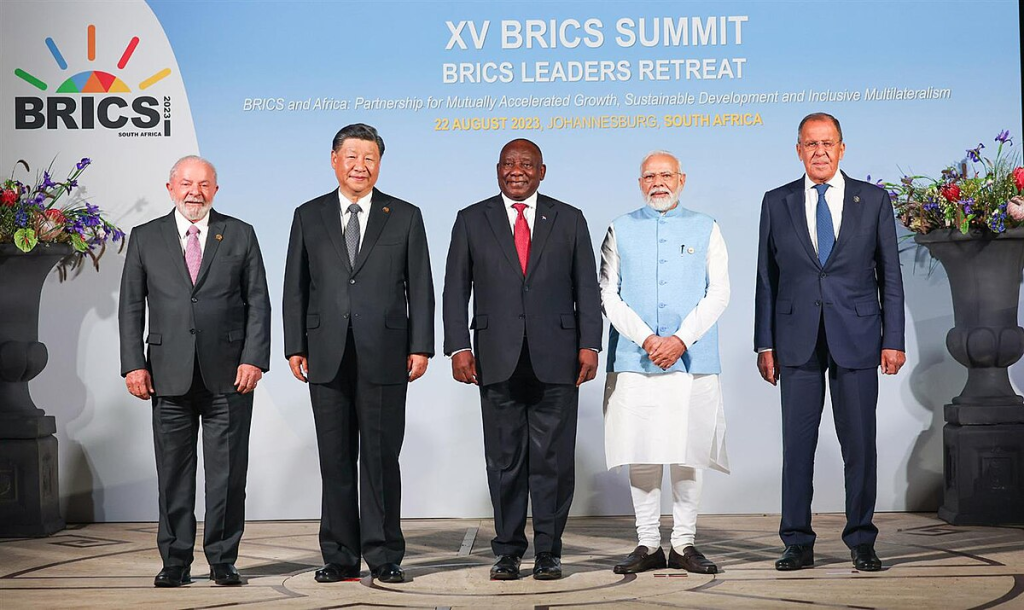
by Abu Hurrairah Abbasi
The BRICS, aimed at fostering collaboration among Brazil, Russia, India, China, and South Africa, is currently broadening its scope. The conference in Johannesburg from August 22 to 24 extended invitations to Argentina, Egypt, Ethiopia, Iran, Saudi Arabia, and the United Arab Emirates to become members of BRICS.
The question regarding Pakistan’s potential membership in BRICS is evidence of the significance of BRICS. The alliance has garnered significant global recognition, prompting many nations to express their aspirations to join its ranks.
The BRICS collective surpasses the G7 in purchasing power parity, encompassing around 27% of the Earth’s land surface, 42% of the worldwide population, and 33% of the global GDP. All five constituent nations of the BRICS alliance also participate in the G20. The current situation is quite intriguing.
According to the chair of the 2023 summit in South Africa, a significant number of nations, estimated to be around thirty-six, have expressed their interest in becoming members of BRICS. These countries include Iran, Saudi Arabia, the United Arab Emirates, Argentina, Algeria, Bolivia, Indonesia, Egypt, Ethiopia, Cuba, the Democratic Republic of Congo, Comoros, Gabon, and Kazakhstan. These nations saw BRICS as a viable substitute for the conventional Western-centric financial industry that relies on the US Dollar. The BRICS nations are currently considering the possibility of introducing a new currency that is backed by gold. This initiative aims to provide an alternative to the dominant position of the US Dollar, which many developing countries favor.
The current paradigm no longer adheres to the dichotomy of “with or without us” but instead embraces the concept of inclusivity, wherein the involvement of all states characterizes the new normal.
Hence, Pakistan cannot remain detached from these developments and alternative options. Given Pakistan’s existing involvement in the One Belt One Road Initiative and the CPEC, it would be advisable for Pakistan to contemplate the prospect of joining the BRICS alliance. The citizens of Pakistan express dissatisfaction with the absence of an invitation for their country to participate in the Johannesburg Summit and its exclusion from the BRICS Plus initiative. On August 25, the Foreign Office (FO) spokesperson addressed the inquiries by indicating that Pakistan will carefully assess the recent developments and decide on future involvement with the organization.
She expressed, “Pakistan strongly advocates for the principles of multilateralism.” Given the circumstances, it would be logical for Pakistan to consider membership in the expanded BRICS, an emerging global organization representing countries in the Global South.
Pakistan’s non-participation in the high-level development conversation preceding the BRICS summit hosted by China was also observed last year. A total of twenty-four countries were in attendance. India, a member of the BRICS alliance, impeded the participation of Pakistan. At that particular juncture, the Foreign Office (FO) articulated its aspiration for the forthcoming involvement of the organization to be grounded in the principle of “inclusivity.” This year, Pakistan was not invited to attend the summit, unlike nearly 30 other countries, primarily from the Global South, who were included. However, Pakistan was invited to a seminar before the summit, during which Senator Mushahid Hussain expressed Pakistan’s interest in joining BRICS Plus.
The strained relationship between India and Pakistan is regrettable yet comprehensible. The government of India has frequently utilized Pakistan to garner support in Hindu-majority regions by capitalizing on the perceived danger of cross-border terrorism. It might be inferred that in the event of Pakistan seeking BRICS membership, India would have likely expressed opposition.
Another problem that hampers the potential for Pakistan’s inclusion in BRICS is its precarious economic condition, further compounded by political instability, violent extremism, and inadequate law enforcement. The member nations of the BRICS alliance will assert their position against Indian objections after they ascertain that Pakistan possesses substantial contributions to provide. Undoubtedly, Pakistan occupies a vital position within the enlarged economic geography of the BRICS nations. Pakistan can be a significant hub, facilitating connectivity between South, Western, and Central Asia.
The era characterized by countries aligning themselves with ideological blocs during the Cold War has concluded. India is a member of the BRICS alliance and concurrently serves as the host country for the G20 summit in New Delhi. The United States and most European countries have implemented sanctions against Russia in response to the situation in Ukraine. However, it is noteworthy that these countries engaged in diplomatic interactions with President Putin during a meeting in New Delhi.
However, this assertion does not hold for developing nations as they heavily depend on Western economies for their sustenance. Based on historical precedent, it can be seen that emerging nations have often faced punitive measures for engaging in behaviors that are perceived as detrimental to the interests of more powerful states.
Pakistan must disengage from being categorized as a certain interest group or alliance member when making autonomous decisions. The current paradigm no longer adheres to the dichotomy of “with or without us” but instead embraces the concept of inclusivity, wherein the involvement of all states characterizes the new normal. Therefore, the necessity of the current era is evident. States left behind will ultimately experience self-directed condemnation over an extended period. In order to facilitate this process, Pakistan must prioritize enhancing its domestic economy and deliberate the possibility of embracing east-west connectivity, synergizing with existing north-south connectivity.


